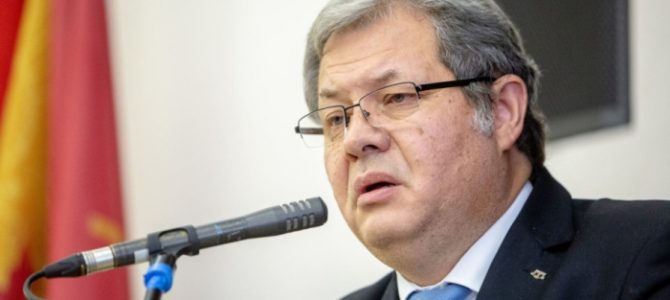Three university history staff and the head of the Lithuanian History Institute report they cannot cooperate any loner with the Center for the Study of the Genocide and Resistance of Residents of Lithuanian (Genocide Center) because of the policies carried out by the leaders of the latter.
Lithuanian History Institute director Alvydas Nikžentaitis, Vilinius University History Faculty dean Loreta Skurvydaitė, Klaipėda University Baltic Regional History and Archaeological Institute director Vasilijus Safronovas and Vytautas Magnus University head of History Faculty Marius Sirutavičius sent notice of this decision to Lithuanian parliamentary speaker Viktorija Čmilytė-Nielsen Monday.
Meanwhile, Genocide Center general director Adas Jakubauskas reported some staff there are dissatisfied with reforms underway there and are making noises about that in the community of historians.
Accusations of Politicization
The historians’ letter to the speaker of parliament said: “Information available to us allows us to say with confidence that when the Center’s general director was replaced in the summer of 2020, his focus began to be guided not by taking into consideration the opinion of specialist academics, but instead by the viewpoint, ignoring the elementary demands of criticism of historical sources regarding events of the past which are sensitive to society and which divide society.”
The historians said there were obvious efforts to limit the freedom of researchers working for the Center, to adapt their research to propagating ideas with little foundation, and to to turn the institution itself into a citadel of a primitive concept of information warfare.
The letter went on to say this was the reason highly-qualified experts are leaving or being terminated from the Center, “decreasing this institution’s abilities to perform the tasks assigned in competently.”
“In consideration of this, the signatories to this letter say that under the current conditions they don’t see any way to continue cooperating with the Genocide Center, and distance themselves from the unprofessional statements of the people representing it.”
Director of the History Faculty of Vytautas Magnus University Marius Sirutavičius told BNS Monday he signed the letter in response to the situation which has arisen inside the Genocide Center, and that he personally knows the experts working there, and hears their stories.
“They are experiencing a kind of pressure, that’s no secret,” he said.
Sirutavičius said the withdrawal of cooperation was intended to help solve the existing situation.
The academics called for the institutions in charge of supervising the Genocide Center to take actions quickly to restore the confidence of the academic community in this institution.
“We believe it is not just consideration of the issue of the director’s responsibility or competency that would contribute to this, but the reduction of political control by the Genocide Center, including the abolition of the public executive board operating under the Center,” the authors of the letter wrote.
They also recommended the Genocide Center form an academic council which would include members delegated from the nation’s academic institutions who are engaged in history research.
The parliamentary speaker plans to meet with several Genocide Center staff Tuesday to discuss the situation.
Disgruntled Staff
Last week the LRT.lt website reported some Genocide Center researchers appealed to Center general director Adas Jakubauskas and leaders in parliament saying research had become ideologized and politicized at the Center following the appointment of new leadership.
That appeal said the Genocide Center leadership had called for engaging in the “defense of history” and “memory wars,” and also had issued irresponsible and unobjective statements and interviews in the name of the Center.
Employees also expressed concern over an emotionally stressful work environment there, and that experienced historians are leaving because of pressure from the leadership.
After this appeal senior advisor to the general director Vidmantas Valiušaitis announced his resignation. Genocide Center staff say a special post was created just for him.
Jakubauskas: Reforms Causing Tension
Union of Lithuanian Tartar Communities chairman and Mykolas Romeris University teacher Adas Jakubauskas was appointed general director of the Genocide Center last June.
He told BNS Monday reforms underway at the Center were responsible for the situation which has arisen.
“Beginning reforms–and reforms are needed for the institution–there is always a portion of people who are dissatisfied. As a rule, these people are in the minority, but when people’s comfort zone is disturbed, they start to resist,” Jakubauskas said.
He said he held a meeting with staff from the History Department of the Genocide Center last Friday. He said that meeting found the problem was exaggerated, and that some Genocide Center staff had signed on to the letter without realizing what they were signing.
“Some people said, I approved one point in the letter, others said, I approved a different point, but there was no general position. This was the position of three or four people, that there is allegedly something not right in the Center,” general director Jakubauskas stated.
“But the organizational working culture and communication inside the Center need to be improved, the Center needs to be reorganized. … Monies were spent irresponsibly, we want to restore order. People got used either to doing little, or working without standing out, and getting a salary for that,” Jakubauskas said.
The general director of the Genocide Center said he wants to create a system of wages so that historians who do much work would get a commensurate salary and those doing less would receive less.
He said he also wants to introduce quality standards for research so there wouldn’t be any doubts concerning this.
Asked to comment on the letter from the university historians and the head of the Lithuanian History Institute, the general director of the Genocide Center rejected the accusations of politicized history research.
“I can say that there is no politicization, there has been no pressure from politicians. Over the half-year I have directed the Center, no politicians, not from the right or left, has called me and directed what I should do,” Jakubauskas told BNS.
He said it was regretful that historians who do not work at the Center have begun judging its internal operations and work.
“It is very strange to me that colleagues from other institutions, from outside, have begun judging. To me, this is unethical. We don’t judge the academic work of the Lithuanian History Institute, the History Faculty of Vilnius University or other scholars from other institutions of higher education,” the general director of the Genocide Center said.
Full text in Lithuanian here.




